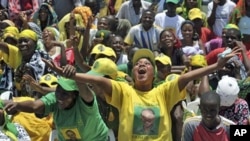An 18-member team from the East African Community has arrived in the Tanzanian capital, Dar-es-Salaam, to observe Sunday's multiparty polls. The elections are expected to be the most fiercely contested since independence from Britan as the Republic of Tanganyika in 1961.
Last-minute preparations are being made in the capital and elsewhere in Tanzania for Sunday's closely-watched elections.
Nearly 20-million people on the mainland will vote for a president, lawmakers, and local leaders. Another 400,000 on the semi-autonomous Zanzibar Island will also choose leaders under a new power-sharing system aimed at preventing election-related violence.
Political analyst Ndimale Tegambwage in Dar-es-Salaam says globalization has changed the focus of many voters in a country that has been politically dominated by one party, Chama Cha Mapinduzi, for nearly half a decade.
"The issue is no longer to replace the ruling party, no. The issues are the economy, on health, on transportation, on how to manage the national resources, and how to utilize them for the benefit of the population," said Tegambwage.
President Jakaya Kikwete, who came to power in 2005 on an anti-corruption ticket, is seeking re-election on pledges to reduce poverty; improve health, education, and transport. Though the country has been spared the internal strife that plagues many of its neighbors in the region, Tanzania still remains one of the poorest countries in the world.
The incumbent says the country is on the cusp of an economic boom, attracting major investors in various economic sectors such as mining. Foreign companies are eyeing the country's large reserves of uranium, nickel, coal, iron, and diamonds. Seventeen companies are exploring for oil and gas on and off-shore.
Tanzania, Africa's third-largest gold producer after Ghana and South Africa, has also benefited from rising gold prices. The central bank reported a 62 percent jump in earnings from gold exports between July 2009 and July 2010, totaling more than $1.3 billion.
President Kikwete recently signed a new mining law that increases royalties paid to the government and also requires the government to own a stake in future mining projects.
But critics of the president say although more money is coming into government coffers, taxes and inflation remain high. They also note that high-level corruption is on the rise. In 2008, the prime minister and two ministers resigned after being exposed in an embarrassing corruption scandal. Several former Cabinet ministers are battling corruption charges in court.
Analyst Ndimale Tegambwage says public dismay over corruption is has been giving momentum to the campaign of Mr. Kikwete's main challenger in the election, Willibrod Slaa. The first-time presidential candidate and veteran lawmaker has promised to fight graft, reduce the size of government, and cut taxes.
"Those who have been in power for 50 years now, they have questions to answer, they have issues to respond to, and they indeed cannot belittle what is going on in this particular election," said Tegambwage.
President Kikwete is expected to win another term in office, but analysts predict it will not be the landslide victory he enjoyed in 2005.
Observers Prepare for Tanzania Polls












